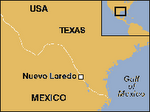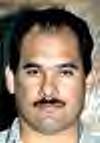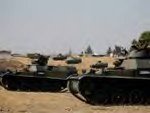Editor’s note: This story was first published in 2004, and is reprinted here with the permission of La Prensa newspaper of Austin, Texas. The story was written long before the detention and arrest of an important Cuban-exile terrorist. Strangely, the United States government is not holding him on terrorist charges for the bombing of a civilian aircraft and the deaths of dozens of innocent victims, he is in protective custody at a secret location for immigration law violations, presumably not being tortured and not contemplating suicide. The following is an outline of how the United States has reached cosmic levels of hypocrisy in its so-called “War on Terrorism.”
By Frank Levine
It was steamy and partly cloudy over Barbados when the DC-8 Cubana de Aviacion Flight 455 roared off the Seawell (Grantly Adams) International Airport at 1:23 p.m., Wednesday, October 6, 1976, and quickly climbed to 16,000 feet with 73 passengers on board. Suddenly, a bomb, disguised as a camera, exploded in the rear toilet of the aircraft, rocking the plane and sending smoke and flames through the passenger cabin and into the flight deck. The pilot radioed to clear a runway at Barbados for an emergency landing. Already 30 miles away from the airport, the plane slowly turned back to the island, losing altitude quickly. Seven minutes after the blast, witnesses on the island saw the plane three miles off shore trailing smoke as it came in from the West, barely 500 ft. above the ocean. It was obvious the pilot was struggling to control the craft as it started to climb, and then stalled at about 1,000 feet, before plunging into the ocean two miles off shore and just 10 miles from the airport. All aboard, including the entire Cuban fencing team, died in the crash.
The two men who had planted the bomb in Barbados, Freddie Lugo and Ricardo Lozano, fled immediately to Trinidad, where they were soon arrested. The pair freely admitted their guilt, claiming they worked on behalf of the Central Intelligence Agency, then headed by George Bush, Sr. They also implicated two other men, alleged CIA operatives Orlando Bosch and Luis Posada Carriles, both of whom were arrested a few days later in Venezuela. Posada Carriles escaped from Venezuelan custody and was subsequently arrested in Panama years later for allegedly plotting to kill Fidel Castro at an international conference. Again, he was eventually released under mysterious circumstances by an outgoing Panamanian president. (Posada Carilles would later be arrested in the United States for “violations of immigration laws” and is currently being held at a secret location supposedly near El Paso, Texas, not as a terrorist, but as an “illegal alien.”) The U.S. government refuses to allow his extradition to Venezuela to face terrorism charges because Mr. Carriles reportedly feels he might be tortured or killed in Venezuelan custody. So far, all those who have admitted responsibility for the bombing and numerous other terrorist acts have escaped justice thanks, in part, to their links to U.S. intelligence, the Bush family, and their Cuban-American “friends” in high places.
AUSTIN, Texas--The George W. Bush’s war on terrorism and, for that matter, the war against terrorism by previous administrations, including that of his father, have developed a very narrow view of who is a terrorist and under what conditions terrorism is acceptable.
The hypocrisy of the U.S. government policy toward terrorism is stunning. While the U.S. was “outraged” at the December 21, 1988 bombing of Pan Am Flight 107 over Lockerbie, Scotland, in which 270 perished, there was absolutely no outrage over the bombing of the Cuban flight by Cuban exiles acting on behalf of the U.S. government.
So while Libyan intelligence officers, supposedly acting on behalf of the Libyan government, were tried and convicted for the Pan Am bombing; Cuban CIA operatives, also accused of mass murder on behalf of the U.S. government, are declared heroes and walk free.
The bombing of the Cuban flight, by any definition, was an act of outright terrorism.
So while the U.S. government, its allies and “friends,” hunt down real and imagined “terrorist” enemies around the world, the Bush family believes that terrorism is in the eyes of the beholder, as both father and sons have willfully and intentionally allowed terrorists to roam free.
And you don’t have to look very far to find them: the airline hijackers, bombers, assassins, mass murderers and torturers. Most live in tranquil luxury protected by the U.S. government. Many continue to ply their trade in death and destruction with impunity, while the U.S. government and the current administration pay lip service to human rights and “democracy” around the world.
Yes, our terrorists live in cities and towns across America. They work next door, across the street, around the bend. Generally, they are not Moslems or of Middle Eastern extraction—they are, for the most part, Cubans, with a spattering of Venezuelans, Nicaraguans, Mexicans, Hondurans and Guatemalans.
The Cuban terrorists have burrowed deep in the hearts of Cuban American communities—Miami, Elizabeth, N.J., New York, Los Angeles, and points in between. But the soul of the Cuban terrorist movement, however, remains in Miami, the arrival and jumping off point in the United States for the vast majority of Cuban immigrants.
For more than 45 years the Cuban terrorists have formed secret cells with the singular purpose -- destroying the Castro regime and stifling any dissent against their policies in and outside of the Cuban exile community.
Their story begins, of course, with the Cuban Revolution, and the blind rage against Fidel Castro that blackened the hearts and minds of many Cuban exiles. Counter-revolutionary forces were created, many with the backing or tacit support of U.S. intelligence agencies and their “friends” in the international business community.
Immediately following the Revolution, these counter-revolutionary forces were uniting, not only in Cuba, but as exiles in the United States. Among them were Alpha 66, founded in 1961, and still active; Omega 7, founded in 1974; The Cuban Nationalist Movement, 1960; Movimiento Insurreccional de Recuperacion Revolucionaria (MIRR), 1959, and the Commando of United Revolutionary organizations (CORU), among many others.
Their level of activity and overall record puts Al Qaeda to shame. For example, between 1968 and 2000, according to Miami police reports, there were an estimated 70 major acts of violence perpetrated by Cuban terrorists -- many of the acts, including assassinations and bombings were carried out against other Cuban exiles in retaliation for having the nerve to suggest that maybe a dialogue could be developed between the United States and Cuba.
These so-called “Freedom Fighters,” backed by powerful U.S. intelligence and Cuban exile community leaders, are not above killing innocent bystanders. They are not above blowing up planes in flight, or bombing and shooting other Cuban exiles who dare to question their direction or authority. In recent years, they have bombed tourist hotels in Cuba and assassinated civilians and government officials throughout the Americas. They even attempted to assassinate heads of state daring to open trade or diplomatic relations with Cuba.
The Bush family connections to these terrorists are direct and deep, winding back to when George Bush Sr. was head of the CIA in the 1970s. It flowered when Jeb Bush linked up with former Batista intelligence officer Camilo Padreda while Bush was chairman, and Padreda was finance chairman, of the Dade County Republican Party -- even though it was widely known that Padreda, along with Hernandez Cartaya, had been indicted for allegedly embezzling $500,000. The charges were eventually dropped after the CIA indicated Cartaya had been working with the agency.
A few years later, Padreda pleaded guilty to defrauding a U.S. government agency of millions of dollars. Former Florida Gov. Jeb Bush, meanwhile, just couldn’t seem to avoid Cuban-exile money linked to terrorism. He reportedly worked for Miguel Recarey, a man alleged to have been a participant in the CIA attempts at assassinating Fidel Castro during the 1960s and early 1970s.
According to recently published accounts, Bush was once employed as a “real estate consultant” and allegedly received $75,000 for “finding” a new location for the Recarey-run International Medical Centres. Of course, the company never actually moved to the “new location.”
By 1985, the younger Bush and his father, then vice-president, helped arrange for IMC to provide free medical care for Nicaraguan “Contras” attempting to destabilize the Sandinista government. Recarey later fled the United States after being charged in a massive Medicare fraud scheme. He remains a fugitive.
Finally, Jeb Bush became campaign manager for Rep. Ileana Ros-Lehtinen, (R-FL), who successfully pushed for the release of Cuban exiles convicted of terrorism and, as recently as a few months ago, called for the assassination of Fidel Castro.
She allegedly lobbied former Florida Gov. Connie Mack, Jeb Bush and his father, to release convicted terrorist Orlando Bosch from federal custody and grant him permanent U.S. residency, over the objections of the Department of Justice.
Bosch was originally convicted in 1968 of firing a bazooka at a Polish freighter docked in the port of Miami. He was also convicted for threats made against heads of state for trading with Cuba. Released from Atlanta Federal Prison in 1972, he soon violated his parole by leaving the country.
By 1974, Bosch was arrested again in Venezuela in connection with two bombings; but the United States declined extradition. He has also been linked to the 1976 plot to assassinate Henry Kissinger in Costa Rica. Finally, after dozens of alleged terrorist acts, he was taken into custody for parole violation, applying immediately for political asylum in the United States.
In 1992, Orlando Bosch received an administrative pardon from George Bush Sr., thanks in part, to the intervention of Jeb and Ileana Ros-Lehtinen.
He lives unrepentant in Miami, along with a number of his freed murderous colleagues, claiming the bombing the Cuban plane was simply “an act of war.”
URGENT UPDATE: A federal judge in El Paso denied a request by Luis Posada Carriles to be released pending a decision by immigration officials on which country could accept him following his deportation.
Judge Phillip R. Martinez threw out Posada's lawsuit on January 21, 2007, after prosecutors said that immigration officials could not release him because he was in U.S. Marshals Service custody.
Although Posada Carriles claims innocence, he was quoted in a New York Times interview boasting of his role in the destruction of the Cabana de Aviacion Flight 455.





